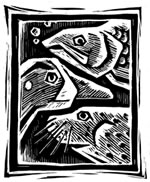- Home
- Restoration Projects
- Project Search
- Sustainable mariculture development for restoration and economic benefit in the EVOS spill area 23220302
Project Information
Title: Sustainable mariculture development for restoration and economic benefit in the EVOS spill area 23220302
Project Year and Number: 2023: 23220302
Other Fiscal Years and Numbers for this Project: 2026: 26220302, 2025: 25220302, 2024: 24220302, 2022: 22220302
Principal Investigator (PI): Katrina Hoffman (Prince William Sound Science Center), Ginny Eckert (University of Alaska Fairbanks), Julie Decker (Alaska Fisheries Development Foundation), John Whissel (Native Village of Eyak; Shellfish and Seaweed Farmers)
Managing Agency: ADFG
Assisting Personnel: Rob Bochenek (Axiom Data Science)
Research Location:
Restoration Category: Research
Injured Resources Addressed: Not Specified
Abstract:The overall objective of the Mariculture Research and Restoration Consortium (Mariculture ReCon) is to support restoration, habitat enhancement, and economic development through research and partnerships between scientists and seaweed and shellfish farmers. This suite of applied research components (Figure 1) takes a farm‐centered approach to address EVOSTC restoration, economic development, outreach, administration, and data management interests that overlap top priorities identified by stakeholders and the Alaska Mariculture Development Plan developed by the Governor’s Mariculture Task Force. Results will inform shellfish and seaweed production with farmers as full 2 participants in the research, including the Native Village of Eyak, which has a permit in progress for the largest oyster and seaweed farm in Prince William Sound. Technology transfer and training for new and existing farmers will investigate farm designs and support industry growth, bringing green jobs and economic diversification to coastal communities in the EVOS‐affected area. Ecosystem studies will evaluate the role of mariculture in restoration of injured resources, habitat provisioning, reducing ocean acidification impacts, pollution mitigation, and supporting fish populations, while evaluating interactions with marine mammals and birds and developing mitigation strategies. Socioeconomic studies will investigate the economic sustainability of hatcheries, and product development will research new products for this nascent industry. We will host listening sessions in coastal communities and incorporate community feedback into research over the 10‐year period to support mariculture development that is responsive to local concerns. Short videos will be created, streamed on social media, and shown in Education & Outreach kiosks to communicate about program activities and inform the public about mariculture. Training of graduate students and postdocs will build capacity, and research collaborations and annual meetings of scientists and farmers will build partnerships and trust that will support sustainable mariculture growth well into the future.
This project was approved for the FY22-FY26 funding cycle.
Proposal: View (7,741 KB)
Reports:
FY23 Annual Report: View (2,587 KB)
Publications from this Project: None Available
Resolutions: